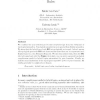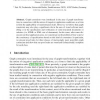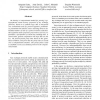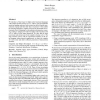144
click to vote
ENTCS
2007
15 years 2 months ago
2007
We consider the non-orthodox proof rules of hybrid logic from the viewpoint of topological semantics. Topological semantics is more general than Kripke semantics. We show that the...
111
click to vote
CLEIEJ
2007
15 years 2 months ago
2007
This work presents proof rules for termination and non-termination for a subset of a C-like language that consists of the statements : assignation, composition, if, skip and while...
130
click to vote
FASE
2008
Springer
15 years 3 months ago
2008
Springer
Abstract. Graph constraints were introduced in the area of graph transformation, in connection with the notion of (negative) application conditions, as a form to limit the applicab...
119
click to vote
FASE
2000
Springer
15 years 5 months ago
2000
Springer
A proof system is presented for the verification and derivation of object oriented programs with as main features strong typing, dynamic binding, and inheritance. The proof system...
120
click to vote
CSFW
2006
IEEE
15 years 8 months ago
2006
IEEE
We develop a compositional method for proving cryptographically sound security properties of key exchange protocols, based on a symbolic logic that is interpreted over conventiona...
121
click to vote
FSEN
2009
Springer
15 years 8 months ago
2009
Springer
We introduce a Hoare logic for higher-order functional languages with control operators such as callcc. The key idea is to build the assertion language and proof rules around an e...
137
click to vote
CADE
2002
Springer
16 years 2 months ago
2002
Springer
Abstract. Proof-carrying code (PCC) allows a code producer to associate to a program a machine-checkable proof of its safety. In the original approach to PCC, the safety policy inc...




